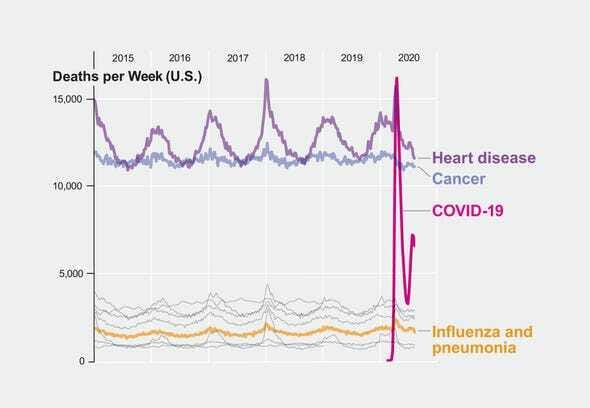Watching the coronavirus pandemic unfold in the US has definitely had a sort of slow-motion trainwreck feel to it. Siobhán O'Grady sets the stage.
Thanksgiving now looms less than two weeks away — and many Americans who plan to gather with family and friends will spend the days leading up to the festivities fretting, isolating, testing and rethinking whether they should get together at all.
Coronavirus cases are surging across the nation and public health officials have warned, time and again, that mingling members of different households for a holiday centered around indoor dinner table gatherings could have disastrous consequences for infection control, especially with hospitals in some states already overwhelmed with covid-19 patients.
This video update from Johns Hopkins puts the circumstances in context with 90-day trends around key statistics. It’s numbing.
Things have gotten so bad that only heart disease and cancer are killing more Americans now.

In the Midwest, especially its rural communities, hospitals are being inundated with patients.
In the Midwest, cases have climbed on average nearly 60% over the past two weeks, compared to 35% nationally. And across the country, most non-metropolitan counties have now recorded at least 100 cases or more per 10,000 people since the pandemic began — that's almost double what it was in early September.
At the same time, those hospitals are suffering from staff members contracting COVID-19. (The Mayo Clinic has had over 900 staff members contract it in the past two weeks and some hospitals in Texas have started using mobile morgues. (El Paso notably doubled it’s mobile morgue capacity a few weeks ago.)
Meanwhile, hospitals are hitting and exceeding their ability to serve pationts around the country. Alexis Madrigal notes that “As a rule of thumb, the COVID Tracking Project has found that an increase in cases shows up as an increase in hospitalizations about 12 days later." If that holds, we’re already on tap for something significantly worse than our already dire circumstances. Add to that the fact that 38% of Americans are expected to go about their normal business for Thanksgiving.
The pandemic is already raging out of control and now we are heading into the US holiday season. The CDC has been described as recommending, warning, and pleading with Americans to not travel for the holiday, but no restrictions have been put in place.
And Dr. Scott Atlas, Trump’s top pandemic advisor, is encouraging people to have large holiday gatherings. The neuroradiologist/political commentator, who reportedly has not taken part in coronavirus task force meetings since September, would like you to have a blowout for Thanksgiving. Stanford University, which hosts the Hoover Institution where Dr, Atlas is a senior fellow, put Atlas’ comments on a small raft and pushed them out to sea. But Stanford’s leaders are well overdue for taking a hard look at its affiliation with the Hoover Institution. (That’s a matter for another day…)
In the alternate reality known as the Trump administration, VP Pence expressed confidence in the admin’s ability to handle the pandemic. As he put it, “America has never been more prepared to combat this virus than we are today.” I guess you could take him at his word.
Pence has also claimed that he and the president do not support another nationwide lockdown.
But as Sanho Tree notes, we’d have to have a first to make another lockdown possible.
If it was my call, I’d have us in a national lockdown right now. It’s the right thing to do for myriad reasons. At minimum, we should be doing it to give our hospital workers the relief they deserve, so that they can do their jobs without being in self-wrought national triage circumstances.
But I have no such authority. Instead, I’ll plead with you to stay home for the holidays, and ask you to extend the same plea to everyone you can. These ads from the German government get at the ‘enormity’ of the ask.
